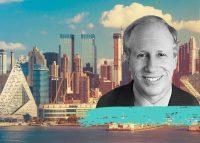Holding the microphone only briefly, developer Richard Mack swung for the fences during a discussion of affordable housing in New York City.
“We are in this situation [of unaffordability] because of rent regulation,” the Mack Real Estate Group CEO said at an event in Midtown. “It creates entitlement for those who have apartments and pushes up rents for those who don’t.”
Mack, a second-generation developer whose family-run firm has developed thousands of apartment units across the country, was joined by government officials, nonprofit leaders and business executives Wednesday at 75 Rockefeller Plaza to discuss the availability of affordable housing at an event organized by U.S. News and World Report.
Although political consensus seems to be shifting in support of housing production in certain areas — such as supply-constrained California — speakers pushed back on the notion that the icy relationship between housing activists and real estate developers in New York City is improving.
“I’m not sure there’s been a thawing,” said Barika Williams, director of the Association for Neighborhood and Housing Development, an advocacy group that seeks to promote affordable housing.
Williams criticized for-profit housing and said a history of “theft, extraction and denial” resulted in a system of privately-owned real estate. “There’s tinkering and then there’s changing the system,” she said.
“Developers aren’t a monolith,” offered Alicia Glen, the founder of mixed-income multifamily developer MSquared and former deputy mayor of housing and economic development under Bill de Blasio. “Some are better than others, and it’s the same with nonprofits. Not all of them can scale projects.”
Williams said that half the city’s population needs units that rent for $1,500 a month and below — the median rent for a Manhattan apartment was around $4,000 as of September — while Mack said that lenders and developers are looking to cities like Phoenix, Mack Real Estate’s largest market, because “other markets want us.”
“In New York,” he said, “developers are made to feel like they’re the devil.”
Read more



The panel also addressed the effects of the pandemic on New York City, and how, from service workers to office landlords, the city’s strictly business areas suffered most directly.
“We need to create more mixed-use communities because office-based neighborhoods are suffering,” said Empire State Development CEO Hope Knight. “We need 24/7 communities in order to rethink commercial real estate in New York City.”
Mack said the Garment District is too business-oriented for the post-pandemic era and would benefit from zoning changes. He also proposed disincentivizing land speculators, who he said prey on rezonings.
“If [developers] don’t build in a certain period of time, there should be penalties,” he said, referring to firms that buy and hold land near rezoned areas, seeking to benefit from appreciation without building any housing.
Mack pointed to the city’s office utilization rate, still hovering below 50 percent, and public infrastructure that makes it easier to commute to Midtown from Connecticut than from eastern Brooklyn.
“Young people are excited about living in New York, just not about going to work in New York,” he said.
